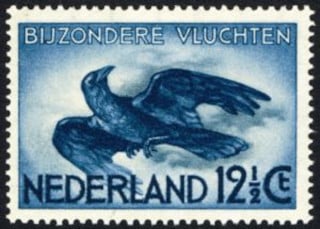No products in the cart.

We share our planet with birds for some time. They were here, even before us. Therefore, it’s time to talk a bit about birds and, of course, birds on stamps.
There is no easy way to write a history of birds in a few sentences, so I’ll use this occasion to quote SceinceDirect:
"Birds are one of the most recognizable and diverse groups of modern vertebrates. Over the past two decades, a wealth of new fossil discoveries and phylogenetic and macroevolutionary studies has transformed our understanding of how birds originated and became so successful. Birds evolved from theropod dinosaurs during the Jurassic (around 165–150 million years ago) and their classic small, lightweight, feathered, and winged body plan was pieced together gradually over tens of millions of years of evolution rather than in one burst of innovation."

Carrion Crow (Corvus corone)
Netherlands – 1938/11/22
Airmail stamp
12½ c – Dutch cent
"Early birds diversified throughout the Jurassic and Cretaceous, becoming capable fliers with supercharged growth rates, but were decimated at the end-Cretaceous extinction alongside their close dinosaurian relatives. After the mass extinction, modern birds (members of the avian crown group) explosively diversified, culminating in more than 10,000 species distributed worldwide today."
Birds play a crucial role in the natural world, providing a variety of important ecological services. One of the most important roles that birds play is as pollinators. Many species of birds, such as hummingbirds, sunbirds, and honeyeaters, feed on nectar and in doing so, transfer pollen from one plant to another, facilitating the process of fertilization and promoting plant growth and reproduction. Therefore, they help nature they same way bees do. You can read more about how bees help us here and here.

Birds from Zwin nature reserve
Greylag Goose (Anser anser), Northern Lapwing (Vanellus vanellus), White Stork (Ciconia ciconia), Common Kestrel (Falco tinnunculus)
Belgium – 1972/12/16
2+1 - 9+4.50 fr - Belgian franc
Birds also serve as seed dispersers, helping to spread the seeds of plants across large distances. Some birds, such as toucans and hornbills, have specialized beaks that allow them to feed on fruit, while others, such as ground doves and thrushes, eat berries and excrete the seeds in their droppings, spreading them over a wide area.

Osprey (Pandion haliaetus), White-tailed Eagle (Haliaeetus albicilla), Little Owl (Athene noctua), Eurasian Eagle-Owl (Bubo bubo)
East Germany (DDR) – 1982/05/18
10 - 35 Pf. - East German pfennig
In addition to their role in pollination and seed dispersal, birds are important predators and prey, helping to maintain a balance in the food chain. Raptors such as eagles and hawks hunt small mammals and other birds, while insectivorous birds such as warblers and flycatchers help to control populations of insects and other pests.
Birds also serve as indicators of the health of ecosystems, with declines in bird populations often signaling larger environmental problems such as habitat destruction, pollution, and climate change.
The first bird stamp (stamp with bird motif) originates from Japan, 1875. This was not only the first bird stamp, but one of the first stamps issued in Japan. Japan's postal system had been founded in 1871, and the first stamps were issued in April 1871. As we know, many countries followed after that, and today we have thousands of beautiful bird stamps.

Bearded Vulture (Gypaetus barbatus ssp. aureus), Short-toed Snake-eagle (Circaetus gallicus gallicus), Eurasian Sparrowhawk (Accipiter nisus nisus), Peregrine Falcon (Falco peregrinus)
France – 1984/09/24
1 - 5 ₣ - French franc
In this article I’ve focused on European birds on stamp issues. The reason was that I needed to narrow down a list of interesting stamps, because there is simply too much material. Still, this opens a possibility you’ll see non-European bird stamps too.

Greetings Stamps 1991 - Symbols of luck
Thrush's Nest, Shooting Star and Rainbow, Magpies and Charm Bracelet, Black Cat, Common Kingfisher with Key,
Mallard and Frog, Four-leaf Clover in Boot and Match Box, Pot of Gold and Rainbow, Heart-shaped Butterflies, Wishing Well and Sixpence
UK – 1991/02/05
1ST
While I was exploring stamps related to this topic, I found many beautiful stamps, and while the “Greetings Stamps 1991 - Symbols of luck” series is not directly related to birds, it also depicts bird motifs, so I simply had to include it in this article.
If you are superstitious, you might find this list of birds that bring good luck interesting.
If you’re interested in collecting bords on stamps, this could be the right source for you http://www.bird-stamps.org
Today we’ve seen birds on stamps. While you wait for the next article, feel free to explore stamps related to Chess on Stamps, Olympic Games, and Tour de France.









